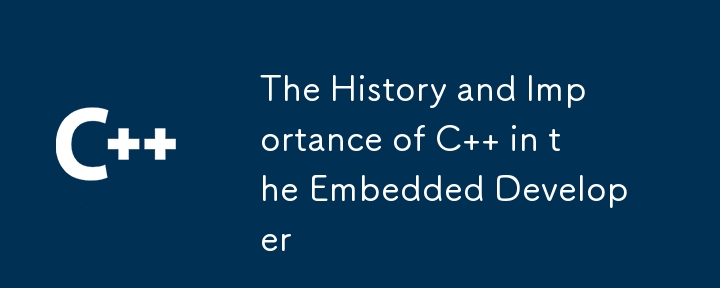

When I started working in embedded systems years ago, C was the language everyone used. It was simple, fast, and reliable. But as technology advanced and devices became more complex, I found myself turning to C++ more and more. Today, C++ is a key tool in my embedded systems work. Let me share why C++ has become so important to me and how it can help in embedded development.
When I began my career, most embedded systems were straightforward. We were mainly focused on controlling hardware with minimal resources, and C was perfect for that. But as embedded systems evolved, the need for more features and smarter devices grew. That’s where C++ came in.
When I first moved from C to C++, I was unsure. C had always worked well for me, so why change? But over time, I realized the advantages of C++:
Efficiency Meets Flexibility:C++ offers the performance I was accustomed to in C but with the added benefits of object-oriented programming. This combination allows for writing code that’s both efficient and easier to manage.
Code Reusability:One of the biggest pain points in C was dealing with repetitive code. With C++, I could leverage features like inheritance and polymorphism to create reusable components, significantly reducing development time.
Direct Control Over Hardware:Despite its higher-level features, C++ doesn’t distance you from the hardware. I could still manipulate bits and bytes directly, which is critical in embedded systems where every cycle counts.
Standard Template Library (STL):At first, I avoided using the STL, fearing it might introduce unnecessary overhead. But as I started to explore it, I realized how much it could accelerate development without compromising on performance, especially in non-critical paths.
Community and Resources:Over the years, I’ve benefited immensely from the active C++ community. Whether it’s finding a library for a specific task or getting advice on optimization, the wealth of resources available has made C++ a lot less intimidating
One lesson I’ve learned the hard way is that while C++ can be incredibly powerful, it requires careful optimization to fully harness that power, especially in resource-constrained embedded environments. Here are some strategies I’ve found effective:
Memory Management:In one project, dynamic memory allocation caused sporadic crashes that were hard to trace. After investigating, I switched to using memory pools and stack allocation wherever possible, which significantly improved stability.
Use of Inline Functions:Inline functions have been a game-changer for me, especially in time-critical sections of code. By reducing function call overhead, I was able to squeeze out extra performance in tight loops.
Move Semantics:When C++11 introduced move semantics, it was a revelation. I was working on a project with heavy data processing, and by utilizing move semantics, I managed to reduce unnecessary data copying, which resulted in noticeable performance gains.
Optimizing for Size:In embedded systems, every byte counts. I often use compiler-specific attributes to control the size of the compiled code. This can be as simple as tweaking optimization flags or as complex as rewriting critical sections to be more compact.
Profiling:In the early stages of a project, I used to optimize based on intuition. But after discovering profiling tools, I learned to target optimizations where they really mattered, often uncovering performance bottlenecks in unexpected places.
Exceptions and RTTI:For most of my embedded projects, I disable exceptions and Runtime Type Identification (RTTI) unless absolutely necessary. This reduces code size and improves performance, making the system more predictable.
Efficient Data Structures:Early in my career, I underestimated the impact of choosing the right data structures. Now, I spend considerable time evaluating whether the standard containers are the best fit or if a custom structure would be more efficient.
Looking back on my journey, I can see how C++ has shaped my approach to embedded development. It’s a language that requires respect—use it recklessly, and you’ll pay the price in performance or complexity. But when wielded with care, C++ offers unparalleled power, flexibility, and efficiency.
For embedded developers, mastering C++ isn’t just about learning a new syntax or set of tools; it’s about evolving your mindset to handle the increasingly complex demands of modern embedded systems. As devices continue to grow smarter and more interconnected, C++ will remain a critical skill, enabling us to build the future of embedded technology.
The above is the detailed content of The History and Importance of C++ in the Embedded Developer. For more information, please follow other related articles on the PHP Chinese website!




